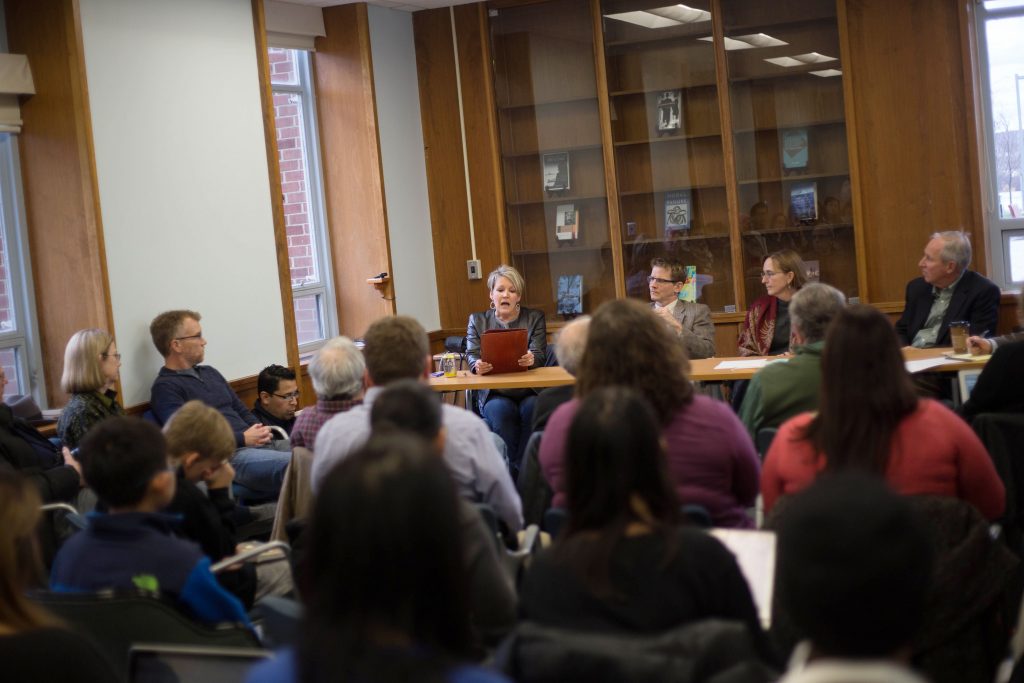
On Friday afternoon, Binghamton University students, faculty and staff gathered to hear a panel of speakers attempt to provide context for the U.S. presidential election.
The event, titled “Election of 2016 in Historical Perspective,” was held in the Institute for Advanced Studies in the Humanities conference room in Glenn G. Bartle Library. The panel was put together by Dael Norwood, an assistant professor of history at BU whose primary focus is 19th century U.S. politics.
The panel was composed of four BU faculty members from a variety of academic backgrounds: Adam Laats, an associate professor in the BU Graduate School of Education and an expert on the history of conservatism; Provost Donald Nieman, who is an expert on race in post-Civil War American politics; Wendy Wall, an associate professor of history at BU who has written extensively on the idea of U.S. identity; and Leigh Ann Wheeler, a professor of history at BU and a specialist on women’s history in the U.S.
Together, the group attempted to help rationalize and quantify the importance of the election of President-elect Donald Trump over former Secretary of State Hillary Clinton.
“It was pretty clear that the election season, no matter how it turned out, was historic,” Norwood said. “On the Republican side, there was a lot of changing of rules and appeals to different rhetoric the United States has not seen in quite some time,” Norwood said. “But also on the Democratic side, the first major party candidate who’s a woman.”
The panelists noted that while Trump may appear to be a unique candidate, there is a history of seemingly radical candidates pursuing office in the U.S. by campaigning during times of uncertainty. They cited the presidential campaign of Vermont Sen. Bernie Sanders as an example of a movement like Trump’s.
“A lot of historians have used status anxiety to explain populists,” Wheeler said. “Status anxiety to explain reform movements. And I’m always skeptical of those explanations, but I’ll tell you what: It’s feeling like that’s explaining a lot of what’s going on here. I think there’s a lot of status anxiety that drove people to vote for that man.”
BU student Oli Nwobbi, a sophomore majoring in economics who voted for Clinton, asked the panel to further expand on this comparison between Trump and Sanders and questioned the nomination of Clinton.
“I feel the election is a failure of the Democratic establishment and the Democratic Party,” Nwobbi said. “They put up a candidate who was bought by Wall Street, that was corrupt, that was corporatist at a time when people wanted nothing like that.”
The panel agreed with Nwobbi that Trump struck a chord with a disgruntled voter base that Clinton could not connect with. They also added that left-leaning populism tends to fall apart over the subject of race, as the party leadership struggles to get white, specifically male, voters to work to support the social justice causes that define progressivism in the United States today.
Johanna Boyes, a junior majoring in art history who supported Clinton, left the panel early to attend a protest on campus to express her displeasure with the president-elect’s stated plans for the direction of the country. She said she agreed with Nwobbi’s statements, reiterating that she believed Clinton’s message failed to connect with many people in the United States.
“The rhetoric of tolerance and diversity that marked her campaign didn’t speak to the concerns of many Americans,” Boyes said. “White, working-class Americans in the Rust Belt feel disenfranchised since the U.S. transitioned to a more tech-based, white-collar economy. Donald Trump offered a scapegoat in Mexican immigrants while Clinton’s campaign barely addressed class directly.”
In her closing remarks, Wheeler chose to address those people questioning the legitimacy of anti-Trump protesters, identifying herself with the Democratic base shocked by the election’s results.
“We had faith in some basic rules of civility,” Wheeler said. “We had faith that facts and evidence matter. We had faith that the electoral system would function properly. We had faith that’s been completely eroded. And that’s why there’s all of this protest happening. We had faith in humanity and it’s been laid to waste.”


